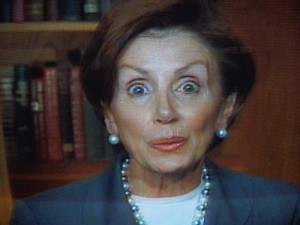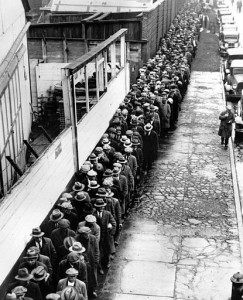
Unemployment Rose in 30 States in January 2010
Despite the claims of various politicians in Washington, D.C. that the recession is over and a recovery is well underway, unemployment continues to surge throughout the United States, as shown in the release of detailed information today by the Labor Department regarding the January 2010 jobs situation. While 30 states reported an increase in the unemployment rate, five states reached all-time highs in unemployment rates:
Unemployment rose in most states in January—even breaking records in several states, according to government data released Wednesday.
Joblessness in five states—California (12.5 percent), South Carolina (12.6 percent) , Florida (11.9 percent), Georgia (10.4 percent) and North Carolina (11.1 percent)—hit a record high. The District of Columbia, at 12.0 percent, also reached a record high.
In all, 30 states and the District of Columbia saw their rates increase in January over the previous month. Nine states reported a decrease and 11 states had no change in their unemployment, according to the Labor Department.
One disquieting, and unreported, detail of the extended January 2010 report is that all of the above numbers are “adjusted” figures and actual unemployment is actually higher. Overall, the American job market appears to be “frozen”:
“It shows that the labor market is virtually frozen,” said Nick Colas, chief market strategist at the ConvergEx Group. Although the data is from January, he said that “there has not been any dramatic change in these past six weeks.”
Many economists and other observers have pointed to the uncertainty caused by the push to fundamentally alter the health care delivery system by the Obama Administration and Democrats in Congress as a potential cause of this “frozen” labor market. Business owners and operators, both small and large businesses, are less likely to hire new employees while facing potential higher costs in the near term from a possible employer mandate and associated tax on employers who do not provide health coverage to employees.

House Speaker Nancy Pelosi has famously claimed, with no discernible substantive basis other than a far left wing think tank report, that passing Obamacare through Congress will “almost immediately” result in a gain of 400,000 jobs in America, with 4 million jobs to be created overall by Obamacare. Even Obama-worshipper and Washington Post writer Charles Lane admits Pelosi’s claim is ludicrous, especially considering the main cost-cutting mechanism, the so-called “cadillac tax”, has been removed until 2018 at earliest, hence postponing any job creation gains from lower health care costs well beyond “almost immediately”:
Here’s my problem, though: For Pelosi’s scenario to pan out, health-care reform must actually produce substantial cost savings. And that is more doubtful now that President Obama has offered a version that postpones the strongest cost-containment provision in the Senate bill — the “Cadillac tax” on high-value insurance plans — until 2018. That’s like postponing it this long. The president did this largely to appease organized labor and their allies in the House Democratic caucus — led by Speaker Nancy Pelosi.
Such claims by Speaker Pelosi are especially odd in light of her statement yesterday that its uncertain what is actually in the bill as she advised reporters that “we have to pass the bill so that you can find out what is in it.” Regardless, considering the uncertainty and outright hostility being generated amongst business owners about the Democratic health care reform efforts, it is much more likely that hundreds of thousands of jobs will be created in America if the partisan effort to comprehensively reform health care is officially shelved by President Obama. Providing this certainty to business owners of the future near term cost of hiring an employee, and not increasing such costs and federal regulatory liability as Obamacare would, could be the single greatest thing Washington, D.C. could do to help the American unemployed find a new job.
Indeed, average Americans overwhelmingly agree with this proposition, as recent CNN polling shows 73% want Obama and the Dems to either stop or start over instead of passing the present comprehensive plan and yesterday’s AP polling shows 68% want Obama and the Dems to continue to work with the GOP to make a deal instead of pushing through the present comprehensive plan without GOP support. A full 57% of Americans believe that Obamacare will hurt the economy – just 25% think it will help. It appears to us that the intuition of the American people and the great center of America have correctly determined that the giant new federal bureaucracy and new federal taxes associated with Obamacare would be a drag, if not an anchor, on the efforts of businesses to rebuild their workforces and the economy as a whole to recover.
Perhaps President Obama, Congressional Democratic leaders and the GOP leadership will all decide that the needs of the American people, regarding jobs and the economy, are more important that scoring political points (and “historical” ones for liberals) over health care reform and immediately shelve the present plan and pass centrist health care reform that would both help some uninsured, reduce costs and provide confidence to business owners so that hiring can begin again.
Technorati Tags: All Time Highs, American Job Market, Barack Obama, Barack Obama, Breaking Records, Bureau Of Labor, Bureau Of Labor Statistics, Busi, Care Delivery System, Chief Market Strategist, Colas, District Of Columbia, Dramatic Change, Employer Mandate, Government Data, Health Care Delivery, Health Care Delivery System, Health Coverage, House Speaker Nancy Pelosi, Joblessness, Labor Department, Market Business, Nancy Pelosi, Recession, Speaker Nancy Pelosi, Surges, Unemployment Rate, Unemployment Rates




